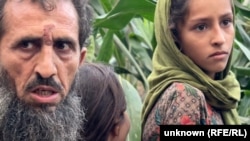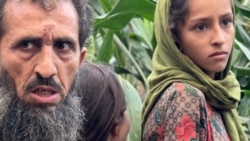MAZAR DARA, Afghanistan -- Wazir Khan was asleep when a devastating earthquake struck his remote village in eastern Afghanistan.
The midnight tremor flattened his home in the village of Mazar Dara in the eastern province of Kunar, trapping his family under rubble.
Khan survived. But most members of his family in Mazar Dara were killed on August 31.
"It was around 11:30 [at night] when there was a tremor and I found myself under the rubble," Khan told RFE/RL's Radio Azadi. "In that moment, I lost 10 members of my family."
Khan's family members were among more than 1,400 people killed in one of Afghanistan's deadliest earthquakes in years. The Taliban government said another 3,000 people were injured.
The magnitude-6.0 earthquake flattened thousands of homes and destroyed entire villages in Kunar, a mountainous province bordering Pakistan, and neighboring provinces. A second earthquake on September 2 prompted panic and interrupted rescue efforts.
The deadly tremor has exacerbated the devastating humanitarian and economic crises that have gripped the impoverished country since the Taliban seized power in 2021. The militant group's takeover triggered major cuts to international assistance.
Nasirullah, Khan's son, was among those wounded in the first tremor. He was sleeping with his father on the roof of their mudbrick home when the earthquake hit.
"I fell from the roof and injured my head," Nasirullah, his head heavily bandaged, told Radio Azadi. "I was buried up to my chest in the rubble, but I immediately pulled myself out and helped my father."
Emergency services have struggled to reach remote villages. Thousands of people are living out in the open and are struggling to access food, drinking water, and shelter.
Recent flooding in the region and rugged terrain have complicated rescue efforts. In some areas, villagers have used their bare hands to clear the rubble in their race to find survivors.
"We are seven families staying together under one tent," said Khan. "We have no proper shelter."
Most of the dead have been buried in hastily dug graves. But some remain unburied due to the sheer number of casualties and lack of equipment.
"Last night, we sat under the tent holding our children, with three bodies beside us," Khan said.














